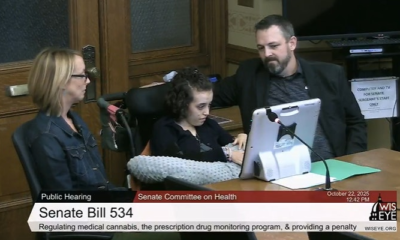adult-use
New Hampshire Senate Passes Cannabis Legalization Bill
Published
1 year agoon

Medical cannabis is legal in New Hampshire, but recreational use has only been decriminalized, not legalized. However, the New Hampshire Senate recently approved of a cannabis legalized bill in a 14-9 vote on May 16, and it’s the farthest that any cannabis legalization bill has reached to date.
If passed into law, House Bill 1633-FN-A would legalize adult-use cannabis for those over 21 years of age, and establish a regulatory framework. This includes a possession allowance limit set at four ounces of cannabis, 10 grams of concentrates, and non-concentrate products up to 2,000 mg THC. Currently, the bill allows for 15 adult-use dispensaries to open up throughout the state in order to avoid market oversaturation.
On May 16, Senators approved and rejected a variety of amendments. One change prevents cannabis business license owners from using their funds to lobby for cannabis legislation, and also bars those individuals from participating in “political activity” or contributing “funds to any entity engaged” in such activities. Another would present the question “Shall we allow the operation of cannabis establishments within the town or city?” to each municipality. A majority “yes” vote would permit retail outlets to open up, while a majority “no” vote would not permit stores to open, and the question cannot be asked again until three years have passed.
Another amendment from Sen. President Jeb Bradley, which he described as his most important amendment, would be to change the proposal of an “advisory board” to that of a “cannabis control commission” in charge of approving rules and regulations. “If we’re going to protect public health, if we’re going to protect the kids in the state of New Hampshire, this board needs to be turned into a control commission,” said Bradley. “Everybody knows I don’t like this bill because of the public health implications. We can make it a little bit better with this amendment.”
During the most recent hearing, Sen. Daryl Abbas explained that there is much more work to be done to flesh out the bill as it progresses. “No cannabis policy will be perfect,” said Abbas during the most recent hearing. He added that the current version of the bill “was drafted to balance the public safety needs of our communities with the legalization of cannabis.” Abbas added that previously there had been “some really, really, really scary policies” in the past, referring to one that would have permitted public smoking outside of the New Hampshire State House.
New Hampshire polls reflect that a majority of residents approve of legalization. “Most of the polls are pretty straightforward, all well over 70 percent on this,” Abbas said.
Sen. Bill Gannon was one legislator who opposed the bill, claiming that it would increase access to drugs throughout the state, making it more accessible to minors, and promote illegal sales. “We are going to change the fabric of New Hampshire if we pass this legislation,” Gannon said.
Bradley also expressed his desire for the bill to be rejected by the Senate. “I don’t want to see it get out of the Senate, period,” he told WMUR. However, he admitted that he will do his best to amend the bill should it become law. “If there are 13 votes for it, I’m gonna try to make it the most user-friendly for New Hampshire,” said Bradley. “So keeping the black market out, making sure the regulatory process is tight, making sure that there is a THC limit on the products that can be sold, and making sure that big marijuana—you know, the same as Big Tobacco—is not dominating the politics of the statehouse. To me that’s really important if it’s going to pass.”
Despite the opposition, advocates celebrated the news and potential future of cannabis in New Hampshire. Organizations such as Marijuana Policy Project praised the move on social media, but urged New Hampshirites to contact state senators and make their voices heard.
Similar reactions were seen when the House approved the bill in April, such as Vicente LLP director of regulatory policy for cannabis and psychedelics, Jen Flanagan. “As with every other state that has legalized cannabis, New Hampshire must work out the details that work for their state and I hope the Senate takes this opportunity to see that safe and legal products are best for the public health and public safety of communities,” Flanagan said.
Next up, House Bill 1633-FN-A will be heard in a second Senate committee, and later receive a second Senate floor vote, before it can be sent back to the House with the new amendments.
There is still the obstacle of getting the bill passed by New Hampshire Gov. Chris Sununu as well. Last May, Sununu explained his stance on cannabis legalization. “During my years as Governor, a bill to legalize marijuana in New Hampshire has never garnered enough bipartisan support to reach my desk. I have never vetoed legislation to legalize recreational marijuana,” he said in a press statement. “In 2017, I was proud to be the first Governor in New Hampshire history to sign legislation decriminalizing small amounts of marijuana so that no one would go to jail for simple possession. We expanded access to medical marijuana and provided a pathway to annul old convictions for marijuana possession.”
Earlier this month, Sununu reiterated his criteria for signing a cannabis legalization bill. “I laid out the eight or 10 things that I’d like to see in that bill for it to get a signature on my desk,” he said in a WMUR interview. “If they meet those stipulations, I’ll sign it. If they don’t, I won’t.”

Author: mscannabiz.com
MScannaBIZ for all you Mississippi Cannabis News and Information.
You may like
-


FDA Weighs Petition On ‘Significant Harm’ Of Marijuana Hair Testing Device’s Positive Results From Secondhand Smoke
-


Wisconsin Lawmakers Rally for Medical Cannabis Legalization in Committee Hearing
-


Massachusetts Campaign To Roll Back Marijuana Legalization Law Is ‘On Track’ To Make 2026 Ballot, Spokesperson Says
-


Village Farms Introduces Industry-First, One-Way Aroma Valve in Cannabis Packaging
-


Ohio House Passes Bill To Remove Voter-Approved Marijuana Legalization Protections And Restrict Hemp Market
-


Sorting Robotics Becomes Cannabis Manufacturing’s First True Systems Integrator
adult-use
Missouri Cannabis Revenue Funds $15 Million to Three Primary Beneficiaries
Published
1 year agoon
May 30, 2024
Since adult-use cannabis passed in Missouri in 2022, the state recently divided $15 million in adult-use sales revenue to fund support services for military veterans and substance abuse treatment programs, as well as the Missouri Public Defenders budget. That amount is projected to increase to $19 million by the time the fiscal year ends on July 1.
Division of Cannabis Regulation (DCR) director Amy Moore recently said that she was pleased with the fund accumulation so far. “It is so rewarding to see the impact of this voter-approved program on organizations that provide vital services to Missourians. We look forward to watching this impact grow and are grateful to be a part of it.” Moore said.
The collection of medical and adult-use cannabis revenue in Missouri differs slightly once operational costs have been paid. The constitutional amendment that legalized medical cannabis five years ago goes directly to the MVC, whereas adult-use cannabis revenue must first pay out any fees relating to cannabis offense expungement, and the leftover amounts are divided up among the three beneficiaries.
These three groups include the Missouri Veterans Commission (MVC), Missouri State Public Defender, and the Missouri Department of Health and Senior Services (DHSS). The MVC is described as a health care and “other services” group that serves both veterans as well as their families, while the Public Defender is a legal option for low-income Missourians. The DHSS’s goal is “to operate a grant program for subrecipients to increase access to evidence-based, low-barrier drug addiction treatment prioritizing medically proven treatment and overdose prevention and reversal methods and public or private treatment options with an emphasis on reintegrating recipients into their local communities, to support overdose prevention education, and to support job placement, housing, and counseling for those with substance use disorders.” This includes maintenance of veterans’ homes and various cemeteries.
The most recent transfer to these groups on May 17 included a total of $15,229,302 split three ways, with each beneficiary receiving $5,076,434.
In January 2024, Moore gave a presentation in front of the House Veterans Committee showing that the MVC will receive a total of $19 million from cannabis sales revenue by the time that the fiscal year ends on July 1. Furthermore, Moore estimated that next year that amount will increase to approximately $22 million. “The governor’s recommendation is quite a bit more than expected and that is tied to the unexpectedly robust sales, mostly on the adult-use side,” Moore said.
At the time, Moore’s data showed that Missouri had collected $98,873,147 in medical cannabis revenue ($41,406,336 of which went to DCR operating expenses and $39,978,820 to veterans). The state had also collected a total of $57,743,824 in adult-use revenue so far (split between $8,152,210 for DCR operating expenses, in addition to the three sets of beneficiaries receiving $1,278,973).
The MVC has received a grand total of $39,978,820 in medical cannabis sales revenue funds since the transfer began in September 2020. During that first year, the MVC received $2,135,510, followed by $6,843,310 in September 2021, $5 million in May 2022, $13 million in September 2022, and finally $13 million in October 2023.
Rep. Dave Griffith, who is also the veterans chair committee, commented on the success of legalization so far. “The amount of sales that they’ve had with commercial marijuana has been just record-breaking and exceeded all expectations and projections,” Griffith said. “Because of that, there’s going to be even more money into that pool than what they projected right after [Amendment 3] passed.” Griffith also commented that his goal is to increase the amount of funds given to the MVC to $50 million annually, citing the need for more money to better serve veterans services. “Many of them, they’re so overburdened with their caseloads that it’s hard to get in with them,” said Griffith. “If we can increase the number we have, we can start trying to cut down on that wait time many veterans have.”
During the most recent round of funds transferred, Moore released a statement in October 2023 about the positive growth coming from the adult-use cannabis market. “It is incredible that Missouri voters passed the adult use amendment less than one year ago, and we are now starting to see the financial impact the program’s success will have on multiple organizations and the Missourians they serve,” Moore said.
At the time, MVC executive director Paul Kirchoff also provided a statement about the benefits of the program. “These funds will help MVC continue to support the existing infrastructure of our seven Veterans Homes,” said Kirchoff.
While legal cannabis continues to serve Missouri, the topic of psilocybin continues to evolve. In March, the Missouri House Veterans Committee recently passed a psilocybin legalization bill (Senate Bill 768) which if passed would allow veterans to use psilocybin therapy.
In April, the Missouri House of Representatives approved a budget bill that sets aside $10 million in psilocybin research grants, which would come from the state opioid settlement funds. The research studies would study how psilocybin affects people with opioid abuse disorder.
Originally this also included the research of ibogaine for treating the disorder but was changed to focus on psilocybin instead. According to Rep. Cody Smith who introduced that budget bill, the switch from ibogaine to psilocybin was due to a discussion he had with the Department of Mental Health the week prior. “They had concerns about the ibogaine research they had read, and there are concerns about the dangers involved in that research,” said Smith. “However, they are interested in the psilocybin piece. And we’ve seen many other states use their opioid settlement funds to that end.”

Author: mscannabiz.com
MScannaBIZ for all you Mississippi Cannabis News and Information.
With a tagline featuring a founding year “Since before we could tell,” Sunset Connect alludes to the fluctuating legal status of the world’s most favored flower. When I visit the manufacturing space in San Francisco—a former lambskin condom factory and, later, a photography studio—the bright white walls are a welcome break from the dark gray day outside. It’s the last day of January 2024, and we’re in the middle of an atmospheric river called a “Pineapple Express,” but from founder Ali Jamalian’s upstairs office that oversees the space, I can only hear taps of the rain outside. Jamalian’s broad smile and kind eyes are the type that light up a room. Coupled with that, he’s a great storyteller. Through personal trials and triumphs, Jamalian has grown into a voice that remembers the outlaws of pot’s past. And, with his brand Sunset Connect, he’s proudly repping the profound legacy that San Francisco represents in shaping the availability of cannabis around the world.
“You have to be an activist,” Jamalian says of operating a cannabis company in the City by the Bay. “You have to advocate for the industry.”
Locals will first notice that Sunset Connect’s logo and branding borrow inspiration from Muni, San Francisco’s public transportation system, including buses, trains, and cable cars. The script on “Sunset”is in the same curving worm-like font as the iconic 1975 Muni logo. And, with packaging showcasing the design of paper Muni bus transfer tickets that were retired in 2016, its brand identity stands as a sort of insider call back to an earlier time. Sunset Connect has evolved over the years but is now putting out hash-infused dogwalkers and trim pre-rolls. The pre-rolls retail at $5.
“I think what we really pride ourselves in is the separation, getting all the fan leaves and the sticks and stems out and really being left with sugar leaf and small buds,” Jamalian says as we walk the manufacturing floor. “My whole point was like, ‘Dude, you’ve got to be able to get something to people at a fair price that they can afford every day.’”
Jamalian believes the batch size, 100 grams, is critical to the salability of his 1-gram pre-rolls and says he’s selling about 25,000 each week.
“We firmly believe that the success of our joints is that they’re hand-topped and twisted,” Jamalian says as I watch an employee complete packing the herb down and adding the wick-like twist of paper at the top. “I think that’s what gives you the good draw and the fact that we grind it in tiny batches of 100 grams.”

The Connect
Steered by hippies and activists who sold grass in the 1970s and provided cannabis to those in medical need in the 1990s, San Francisco stands as a significant touchpoint for the medical marijuana movement. Actions that took place there and in the greater San Francisco Bay Area led California to become the first state to approve medical marijuana in 1996.
The Sunset Connect brand was born in California’s medical marijuana era and was granted a state license as a manufacturing and distribution company in the adult-use cannabis marketplace in 2020. Based in the city’s Sunset District and known as The Sunset Connect, Jamalian and his best friends since freshman year at the University of San Francisco brought cuts of classic strains to medical marijuana dispensaries circa 2014. This included White Widow—an extremely popular strain in the late ’90s and early 2000s following its win at the 1995 Cannabis Cup—and a strain breeders Mr. Sherbinski and Jigga created in a Sunset District garage around 2010, Sunset Sherbert.
While the Sunset Connect team went official in 2014, they had been growing pot together for some time before that. Back in 1999, the feds charged Jamalian with possession and intent to distribute weed, and since he was a German-Iranian with a green card, he faced deportation. Spooked from the ordeal, he returned to Germany for a time and returned to the United States when his friends called him back into the game.
“At that point, the boys were already blowing up like 15 houses in the Sunset and around town and doing really well with it, vending to dispensaries, but mostly moving it black market,” Jamalian says. “So I came back… I started with one house on 47th [avenue] and about two to three years later about four to five houses and then between us we had like 30-35 homes.”
In 2018, when Jamalian started working to bring Sunset Connect into the adult-use cannabis marketplace, he began to get politically involved with organizations designed to advocate for the industry. But within those groups, such as the now-defunct California Growers Association, he says he often found business owners campaigning on behalf of their companies rather than the community.

“Everyone that I worked with was moving weight and risking their lives to move weight,” Jamalian says. “And most of them didn’t get to transition…The heads in the Sunset weren’t being considered because we didn’t have warehouses; we had homes. Because back then, the criminal liability of growing at home was a lot less than the criminal liability of a 90-light warehouse.”
His role as a public-facing cannabis grower took the next step when Jamalian connected with Jane Kim, a member of the San Francisco Board of Supervisors, who was running against acting mayor London Breed in 2018.
“When I met Jane, I told her I was already trying to build this place up and go legal, and she’s like, ‘In this city, you have to become an activist,’” Jamalian says. “She really taught me the way around City Hall.”
In January 2020, Jamalian became a member of the San Francisco Cannabis Oversight Committee, a representative group of cannabis company leaders that advise the board of supervisors and the mayor regarding implementing and enforcing city laws and regulations relating to cannabis. Beyond his political work, he’s always looking to network inside the cannabis community and puts on a monthly gathering in a Sunset District bar for budtenders.
“I think building a community, not to sell your product, it gives people an emotional connection to your brand,” Jamalian says. “We were the underdog, and we still are, and I think people like to root for the underdog.”
Kim’s cousin, Sam Joo, now works for Jamalian, handling compliance and production. Upon meeting him, Joo is locked in deep on the computer, navigating a change in California policy that vastly reduced the number of labs authorized by the state to test cannabis. When we chat about the current scene, he uses a phrase that became a touchpoint in describing California cannabis before its adult-use stage, the Wild West.

“We don’t have a choice but to build our production around what the labs are capable of doing,” Joo says. “I guess the excuse is that it’s new. I don’t know if other industries have faced what the cannabis industry is facing, but it feels like the Wild West, you know, where nobody really knows what they’re doing.”
The fluctuating nature of the regulations in the state’s adult-use cannabis industry has compounded with other factors, such as a dip in wholesale prices, in driving many longtime weed companies out of the market. Cannabis cultivators in California are disappearing in droves, and San Francisco is no exception to those statistics. Reporting done by the Cannabis Business Times in March 2023 shows that the state has lost thousands of cultivation licenses in recent years.
Jamalian tells me he’s learned that surviving in the cannabis industry means you have to be willing to expand and contract. He is readying for his brand to grow and plans to cultivate and release flowers under the Sunset Connect brand again soon. With that anticipated launch, he’s bringing back Dosi-Pie, a Velvet Pie and Do-Si-Dos cross. It’s the strain he says the brand was most well-known for at dispensaries back in the day. Sunset Connect’s current version has a peppery spice on the nose and tastes how sandalwood incense smells.

Now in his second term on the oversight committee, Jamalian uses his decades of experience in the city’s cannabis scene to advocate for the weed industry that remains in San Francisco.
“The market is on a downward slope; there’s going to be 30% of brands who disappear,” he says. “People are looking for good flowers from San Francisco. Also, there’s not a lot of outfits here anymore producing really good flowers.
“So, while San Francisco contracted, I think similar to the AI boom, cannabis companies are about to bloom again. Because the few that are left, they have a foot in the market, they’re now established, and people are like, ‘Wait, San Francisco is where the best weed in the world all comes from.’”
This article was originally published in the May 2024 issue of High Times Magazine.

Author: mscannabiz.com
MScannaBIZ for all you Mississippi Cannabis News and Information.
adult-use
Delaware Bill Would Allow Medical Cannabis Operators To Sell Adult-Use Cannabis
Published
1 year agoon
May 22, 2024
In Delaware, a new bill is being proposed to allow medical cannabis businesses to also sell adult-use cannabis once the state’s adult-use sales begin.
House Bill 408 was recently introduced on May 16 by sponsors Rep. Ed Osienski and Sen. Trey Paradee. Delaware’s Marijuana Control Act was enacted on April 27, 2023 without the signature of Gov. John Carney, and went into effect starting on August 1, 2023. It created four different license types but none of which currently permit medical cannabis compassion centers to take part in the upcoming launch of adult-use sales. If passed, HB-408 would create a temporary conversion license that medical cannabis businesses can apply for in order to sell adult-use cannabis, and if the application is approved, the license would expire after four years have passed, and can then be renewed again.
“As Delaware moves closer to the launch of recreational marijuana sales, it’s important that we continue exploring and implementing policies that will bolster the program’s success and support both new and existing retailers,” Osienski said in a press release. “Our experienced compassion centers are well-equipped to navigate this transition, and the funds generated from their conversion license fees will serve as a vital funding source for social equity applicants, empowering them to kickstart their ventures.”
According to HB-408, the medical cannabis business must currently be eligible for renewal within the medical program, must be able to show that it can meet market demands (in addition to verify its plans for continued service in medical cannabis and show support for the social equity program), and have a signed labor peace agreement with a labor organization. Applicants must also pay the fee for a conversion license, which is currently set at $100,000 per license. The proceeds from the fee will be used to give financial assistance to conditional license holders who are also social equity applicants.
“For us, passing the Marijuana Control Act was always about our desire to replace an illegal market that has overwhelmed our court system and damaged lives with a legal, regulated and responsible industry that will create thousands of good-paying jobs in Delaware,” Paradee said. “We also need to protect the jobs created by our compassion centers, who have already put in the hard work of standing up an industry and have the capacity and infrastructure to meet demand on Day 1.” Paradee added that providing an avenue for medical cannabis businesses to participate in the adult-use market will aid communities harmed by the War on Drugs.
If HB-408 became law, it would require that the Delaware Office of the Marijuana Commissioner open up applications between August 1-November 1, 2024. For now, it heads to the House Economic Development/Banking/Insurance and Commerce Committee.
Earlier this year, Osienski introduced another bill, House Bill 285, which aims to expand the Delaware medical cannabis program. Medical cannabis was first legalized in Delaware in 2011 but sales didn’t begin until 2015 when the first dispensary began operation.
If passed, HB-285 would allow senior citizens to become medical cannabis patients, permit healthcare providers to determine whether or not medical cannabis could be useful for a patient, and improve the cannabis registry ID card process. “With the full legalization of adult-use recreational marijuana last year, my colleagues and I agreed that our medical marijuana law needed to be updated to help the people who rely on those products get the therapy they need,” said Sen. Kyra Hoffner, according to WBOC. “These changes will allow healthcare providers to make sound decisions about which treatments best fit their patients, and make those treatments more readily accessible to people who need them the most. I want to thank my colleagues in the General Assembly for continuing to support a responsible and reasoned approach to both recreational and medical marijuana in the First State.”
HB-285 is currently waiting on Gov. Carney’s desk for a signature or veto.
In April, Osienski and Paradee, in addition to state treasurer Colleen Davis, filed House Bill 355, which would implement state protections for banks who seek to serve licensed cannabis businesses. This would apply to banks as well as “credit unions, armored car services, and providers of accounting services” which wouldn’t be subject to prosecution under Delaware state law. “This is really a public safety issue,” said Paradee last month. “We do not want any of the current medical cannabis providers or the coming recreational cannabis providers to struggle with that issue.”
While these bills await their respective approvals, many eagerly await the news of when adult-use cannabis sales will begin. While an official date has not yet been verified, the most recent launch estimate is currently looking toward March 2025, according to Delaware Marijuana Commissioner Robert Coupe told the Joint Finance Committee in February.
In the meantime, a slew of other bills recently headed to Gov. Carney’s desk for approval, such as House Substitute 1 for House Bill 162, which would legalize human composting. If approved, it would allow licensed morticians to care for the deceased as they decompose by mixing the bodies with wood chips, straw, and other organic materials. After fully decomposed (estimated to take approximately 30 days), the compost would be returned to the family to use as they see fit.

Author: mscannabiz.com
MScannaBIZ for all you Mississippi Cannabis News and Information.

FDA Weighs Petition On ‘Significant Harm’ Of Marijuana Hair Testing Device’s Positive Results From Secondhand Smoke

Wisconsin Lawmakers Rally for Medical Cannabis Legalization in Committee Hearing

Massachusetts Campaign To Roll Back Marijuana Legalization Law Is ‘On Track’ To Make 2026 Ballot, Spokesperson Says

Village Farms Introduces Industry-First, One-Way Aroma Valve in Cannabis Packaging

Ohio House Passes Bill To Remove Voter-Approved Marijuana Legalization Protections And Restrict Hemp Market

Sorting Robotics Becomes Cannabis Manufacturing’s First True Systems Integrator

Wisconsin Senators Hold Hearing On GOP Leader’s New Medical Marijuana Legalization Bill

Tariffs And Visas Add To The Cannabis Industry’s Misery

Rhode Island Cannabis Chair Steps Down; Adult-Use Dispensary Awards Months Away

How America Accidentally Legalized Lab Cannabis

New Hampshire Lawmakers Announce Plans For Marijuana, Psychedelics And Hemp Bills For 2026 Session

Metrc Announces In-Person Events in New York to Prepare Licensees For Track-and-Trace Implementation

Top Rhode Island Marijuana Regulator Steps Down Ahead Of Possible Campaign For Attorney General

Lifestyle Brand Cookies Launches in Brazil With Premium Wellness Products

Alcohol companies lobby Congress on cannabis drinks (Newsletter: October 22, 2025)

Millennials Are Spending Big on Luxury Travel

Ohio Lawmakers Advance Bill To Scale Back Voter-Approved Marijuana Law And Impose Hemp Regulations

Data Confirms Cannabis Is Safer Than Alcohol

American Council of Cannabis Medicine Unveils Major Industry Initiative to Expand Medical Cannabis Access

Scientists Develop New Class Of CBD Using A Common Kitchen Spice—Not Cannabis

Evidence About Burning Mouth Syndrome And Cannabinoids

Raw Garden Acquires ‘California Love’ to Grow Clean Cannabis Movement

Rhode Island Marijuana Officials Approve Timeline For Awarding New Dispensary Licenses

‘Rent-a-License’ Scheme Highlights New York Cannabis’s Track-and-Trace Problem

Alert: Department of Cannabis Control updates data dashboards with full data for 2023

Connecticut Appoints The US’s First Cannabis Ombudsperson – Yes there is a pun in there and I’m Sure Erin Kirk Is Going To Hear It More Than Once!

5 best CBD creams of 2024 by Leafly

Recreational cannabis on ballot for third time in South Dakota

EU initiative begins bid to open access to psychedelic therapies
New Study Analyzes the Effects of THCV, CBD on Weight Loss

Free delta-9 gummies from Bay Smokes

5 best autoflower seed banks of 2024 by Leafly

Discover New York’s dankest cannabis brands [September 2024]

May 2024 Leafly HighLight: Pink Runtz strain

Press Release: CANNRA Calls for Farm Bill to Clarify Existing State Authority to Regulate Hemp Products

5 best THC drinks of 2024 by Leafly

Local medical cannabis dispensary reacts to MSDH pulling Rapid Analytics License – WLBT

6 best CBD gummies of 2024 by Leafly

Curaleaf Start Process Of Getting Their Claws Into The UK’s National Health System – With Former MP (Resigned Today 30/5/24) As The Front Man

Horn Lake denies cannabis dispensary request to allow sale of drug paraphernalia and Sunday sales | News

5 best delta-9 THC gummies of 2024 by Leafly

Mississippi city official pleads guilty to selling fake CBD products

The Daily Hit: October 2, 2024

Nevada CCB to Accept Applications for Cannabis Establishments in White Pine County – “Only one cultivation and one production license will be awarded in White Pine County”

5 best THCA flower of 2024 by Leafly

Weekly Update: Monday, May 13, 2024 including, New Guide for Renewals & May Board meeting application deadline

6 best hemp pre-rolls of 2024 by Leafly

PRESS RELEASE : Justice Department Submits Proposed Regulation to Reschedule Marijuana
Trending
-

 California Cannabis Updates1 year ago
California Cannabis Updates1 year agoAlert: Department of Cannabis Control updates data dashboards with full data for 2023
-

 Breaking News1 year ago
Breaking News1 year agoConnecticut Appoints The US’s First Cannabis Ombudsperson – Yes there is a pun in there and I’m Sure Erin Kirk Is Going To Hear It More Than Once!
-

 best list1 year ago
best list1 year ago5 best CBD creams of 2024 by Leafly
-

 Business1 year ago
Business1 year agoRecreational cannabis on ballot for third time in South Dakota
-

 Business1 year ago
Business1 year agoEU initiative begins bid to open access to psychedelic therapies
-

 cbd1 year ago
cbd1 year agoNew Study Analyzes the Effects of THCV, CBD on Weight Loss
-

 Bay Smokes1 year ago
Bay Smokes1 year agoFree delta-9 gummies from Bay Smokes
-

 autoflower seeds1 year ago
autoflower seeds1 year ago5 best autoflower seed banks of 2024 by Leafly
